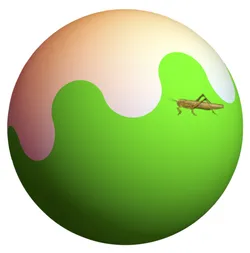Data Science News
Wearable IoT Electronic Nose for Urinary Incontinence Detection
Work performed by Computer Systems Engineering student Michael Shanta for his 3rd year project, supervised by Dr. Marina Cole and Dr. Siavash Esfahani in the School of Engineering, was written up in a paper that was recently accepted for presentation at the IEEE Sensors 2020 Conference.
For his 3rd year project Michael worked on developing machine learning techniques for an Electronic Nose in order to classify odours based on the sensor responses. The system aims to detect incontinence incidents, allowing alerts to be sent to relevant personnel from an IoT network via a cloud server.
Grasshopper jumping on a sphere gives new quantum insights
 Dr Dmitry Chistikov and Professor Mike Paterson, together with physicists Olga Goulko (Boise State University) and Adrian Kent (Cambridge), have published an interdisciplinary paper Globe-hopping, solving a probabilistic puzzle on the sphere that has applications to quantum information theory.
Dr Dmitry Chistikov and Professor Mike Paterson, together with physicists Olga Goulko (Boise State University) and Adrian Kent (Cambridge), have published an interdisciplinary paper Globe-hopping, solving a probabilistic puzzle on the sphere that has applications to quantum information theory.
Suppose a lawn must cover exactly half the area of a sphere. A grasshopper starts from a random position on the lawn and jumps a fixed distance in a random direction. What shape of lawn maximizes the chance that the grasshopper lands back on the lawn? A natural guess would be that a hemispherical lawn is best. It turns out, however, that this is nearly never the case — there are only a few exceptional jump sizes.
This work involving spherical geometry, probability theory, basic number theory, and theoretical physics appears in the Proceedings of the Royal Society A and shows, apart from concern for the well-being of grasshoppers, that there are previously unknown types of Bell inequalities. The Bell inequality, devised by physicist John Stewart Bell in 1964, demonstrated that no combination of classical theories with Einstein's special relativity is able to explain the predictions (and later actual experimental observations) of quantum theory.
A University press release can be found here.
PETRAS SRF award to Dr Arshad Jhumka to investigate trust in IoT systems
Dr Arshad Jhumka from the department’s Artificial Intelligence research theme has been awarded a grant as PI, under the PETRAS SRF programme, to develop and deploy a trusted edge-based Internet of Things (IoT) network. IoT networks are expected to be deployed as solutions to problems in a wide variety of contexts, from non-critical applications such as smart city monitoring to providing support to emergency services such as critical communications. As IoT devices are resource constrained, execution of resource-hungry applications will be offloaded to edge networks for quick response. Such an infrastructure is open to cyber-attacks and needs to be resilient to attack.
